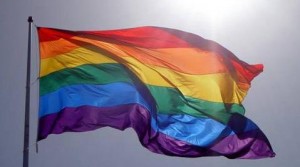 Amelia Eskenazi and Emma Troughton, both openly lesbian high school juniors from Indiana, wrote an article on how detrimental HJR-3 for their state. For the sake respecting their privacy, the name of the high school they attend is not given, along with a name of a teacher.
Amelia Eskenazi and Emma Troughton, both openly lesbian high school juniors from Indiana, wrote an article on how detrimental HJR-3 for their state. For the sake respecting their privacy, the name of the high school they attend is not given, along with a name of a teacher.
“The fight began in 2011 when the Indiana General Assembly passed an amendment to change the definition of marriage within the state of Indiana. More recently, in its nearing threat to become implemented into Indiana law, it has become a hot button topic. In August 2013, a grassroots organization called Freedom Indiana was created as a “coalition of businesses, faith leaders, civil rights and community organizations, and individuals united to defeat HJR-3.” After being filed in the Indiana House of Representatives, Speaker of the House Brian Bosma changed the committee to one in which the amendment had a better chance of passing. The amendment originally had two parts: the first part intended to ban gay marriage in the state of Indiana (just to doubly ensure that it could never become legalized even though it is already illegal) and a second sentence that would ban civil unions. On January 27th 2014, the Indiana House of Representatives voted 52-43 for the removal of the second sentence, thus leaving only the initial ban of gay marriages in the amendment.
‘Only a marriage between one (1) man and one (1) woman shall be valid or recognized as a marriage in Indiana.’ This initial sentence was voted on the following day by the Indiana House of Representatives to be sent to the Indiana Senate for a vote on the altered amendment. On February 17th 2014, the Indiana Senate voted on keeping the altered amendment with a vote of 32-17. With the final vote, the iniquitous second sentence of the amendment was removed and subsequently, as was the possibility of the amendment appearing on the ballot later this year. Throughout the entire process of amending and voting on the amendment, an astonishing number of colleges and businesses came out against HJR-3 and gave their support for the freedom of all people of Indiana including Indiana University, Butler University, Eli Lilly & Co., and Emmis Communications.
Despite this widespread support for the freedom of all Indianans, the amendment, if passed, will further the marginalization of LGBT Hoosiers. It could very well result in an insurmountable regression of any recently cultivated freedoms for members of the LGBT community in Indiana. Many more voices will be silenced and many will be forced into the all-too-well-known confines of the closet.
We [Amelia and Emma] are best friends, both juniors at a small and fairly liberal college preparatory school, just north of Indianapolis. At our school, we both have come so far in discovering our own true identities. We both recently came out as lesbians and now lead our school’s GSA (Gay Straight Alliance) club. Because of this, we have been exposed to some pretty amazing LGBT identifying people – both teachers and students–including our favorite teacher. Like us, she too is a lesbian. But she, unlike us, is in her mid-30s with a partner and 4-year-old daughter. Her daughter was delivered by her partner and because of this, she had to face some major obstacles just to be able to legally attain parental status. She ended up having to adopt her own daughter. Though this little narrative is not directly related to HJR-3, we share it to give you an understated feel for what LGBT members already face in the state of Indiana, without HJR-3.
Indiana is already one of the worst states for LGBT residents. HJR-3 is not introducing anything new in terms of what is already legal and what is not. But, HJR-3 is toxic in its aptitude to squander spirits and diminish hope in LGBT youth, adults, and elders. Its entire existence is fueled by ignorant, hateful people who seek to inhibit the freedoms of people who just want to be allowed to love and be themselves. It is unconstitutional, let alone immoral. Over the last decade, we have come so far in the LGBT rights movement – the legalization of gay marriage in 17 states, laws working to be passed to protect discrimination against LGBT members in schools and workplaces, and even the growing recognition of LGBT members as human beings. The lesbian, gay, bisexual, and transgender community of Indiana is going to continue to fight.”
